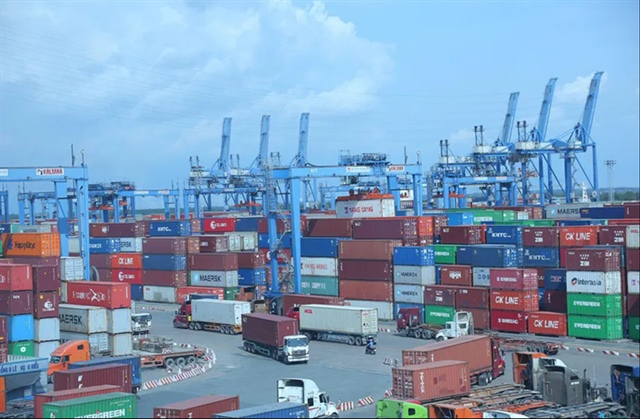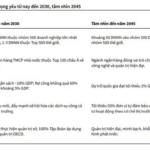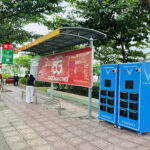The Ministry of Industry and Trade is drafting a new decree to replace Decree 69/2018, which details certain provisions of the Foreign Trade Law. This update aims to tighten the management of foreign trade and align it more closely with current realities. One of the key new features of this draft is the clear stipulation of the time limit for temporary import and re-export.
Tightening Temporary Import and Re-export: A Crucial Move
Under the new regulations, goods under temporary import and re-export status can remain in Vietnam for no more than 60 days from the completion of customs clearance. Extensions are allowed, but only up to two times, with each extension not exceeding 30 days. This is a significant change from the previous policy, which allowed businesses to extend the period indefinitely.
After the specified period, traders must re-export the goods from Vietnam or dispose of them, bearing the responsibility for disposal.
Secondly, the draft requires that temporarily imported and re-exported goods can only be transported through international border gates or main border crossings. Transit through subsidiary border gates or open paths is only permitted with a decision from the Prime Minister. This stringent measure aims to curb cross-border smuggling and counterfeit goods, which have been persistent issues.
Additionally, the draft mandates permits for sensitive, prohibited, or specially controlled goods. For ordinary goods, businesses only need to complete customs procedures.
Associate Professor Dr. Dinh Trong Thinh, an economics expert, believes this draft is essential, especially given the prevalence of entities exploiting temporary import and re-export policies for smuggling.
According to Dr. Thinh, there have been instances where prohibited goods were disguised as goods in transit or temporary import and re-export between Ho Chi Minh City and Cambodia, a recurring issue at some southwestern border gates.
There have also been cases where, during transit, businesses diverted goods for domestic consumption. Similarly, vehicles and scrap materials under temporary import status often failed to be re-exported as required.
Recently, the Economic Police Department of the Ho Chi Minh City Police uncovered a large-scale smuggling operation involving oil, exploiting the temporary import and re-export policy. This complex case led to the prosecution of dozens of individuals.
“This highlights the importance of tightening regulations on goods in transit, particularly the requirement to use only international or main border gates, as a measure to reduce smuggling and tax evasion,” Dr. Thinh stated.
Dr. Huynh Thanh Dien, another economics expert, agrees with the Ministry’s proposal.
He noted that the U.S. has imposed a 20% retaliatory tariff on goods imported from Vietnam. Notably, the U.S. announced a 40% tariff on goods from any country deemed to be transshipped. U.S. authorities also refuse to reduce or waive penalties for goods identified as transshipped to evade taxes.
“Although the U.S. has not yet provided a specific definition of transshipped goods, I believe it refers to goods produced or processed up to 90% in another country, then brought to Vietnam for final assembly, packaging, and labeling as ‘Made in Vietnam’ before being exported to the U.S.
If we allow foreign businesses too much time for temporary import and re-export, they could easily complete such processing, risking a 40% tariff if detected. This would significantly impact the entire industry, not just individual companies. That’s why the Ministry of Industry and Trade must tighten regulations to protect the market,” Dr. Dien explained.
Dr. Dien also emphasized that the U.S. remains a critical market for Vietnam, particularly for sectors like textiles and electronics. Therefore, caution regarding the origin of goods and export metrics is essential.
He finds the proposed maximum time limit for temporary import and re-export reasonable, as temporary imports should not be prolonged to avoid origin-related risks.
“However, we should further streamline administrative procedures for extensions and customs clearance, which are currently bottlenecks, to help businesses, especially foreign ones, comply with state regulations and international standards,” Dr. Dien added.

Tightening the time limit for temporary import and re-export aims to protect domestic businesses and consumers. Photo: CTV |
Balancing Domestic Business Interests
Mr. Nguyen Chanh Phuong, Vice Chairman of the Handicraft and Wood Industry Association of Ho Chi Minh City (Hawa), views the end of indefinite transit periods for temporary import and re-export as positive for businesses across sectors, especially since Vietnam is not yet a global logistics hub.
However, Mr. Phuong suggests considering specific cases for domestic businesses.
For instance, a Hawa member company has proposed eliminating the 25% export tax on sawn timber sourced from imports.
This company imports roundwood from the U.S., processes it into sawn timber in Vietnam, and then exports it to a third country (China), currently subject to a 25% tax.
“Previously, this tax aimed to protect domestic sawn timber. However, in this case, we use imported roundwood, processed into sawn timber in Vietnam.
Maintaining this tax under the new temporary import and re-export policy offers no benefits. Conversely, removing it would encourage increased roundwood imports from the U.S., boosting processing and exports to China. This would create jobs, strengthen trade relations with the U.S., and diversify supply chains,” the company argued.
According to Mr. Phuong, while tightening temporary import and re-export is necessary, exceptions should be considered to stimulate domestic businesses.
From a business perspective, Mr. Nguyen Ngoc Ty, CEO of Non Son Fashion Company, believes the draft is essential for protecting the domestic market and combating trade fraud. Reducing storage time and managing international border gates will significantly deter the legalization of prohibited goods.
Mr. Ty stresses the need to harmonize the new decree with the Customs Law, Tax Administration Law, and international treaties, especially as Vietnam is a party to numerous free trade agreements.
Any restrictive measures must comply with commitments while remaining deterrent.
Mr. Ty believes the new decree will be effective only with coordination among agencies like Customs and Industry and Trade. Establishing transparent monitoring mechanisms and quality inspection systems at international border gates is crucial to identify counterfeit goods during clearance, preventing substandard goods from entering Vietnam under temporary import and re-export labels.
|
“Vietnam aims to become a global logistics hub, a center for international trade and transit. Tightening temporary import and re-export is not about tax revenue but about fostering a healthy export environment to attract international transactions. This will drive the development of logistics services and related industries.” Dr. Huynh Thanh Dien |
THU HÀ
– 05:59 25/09/2025















